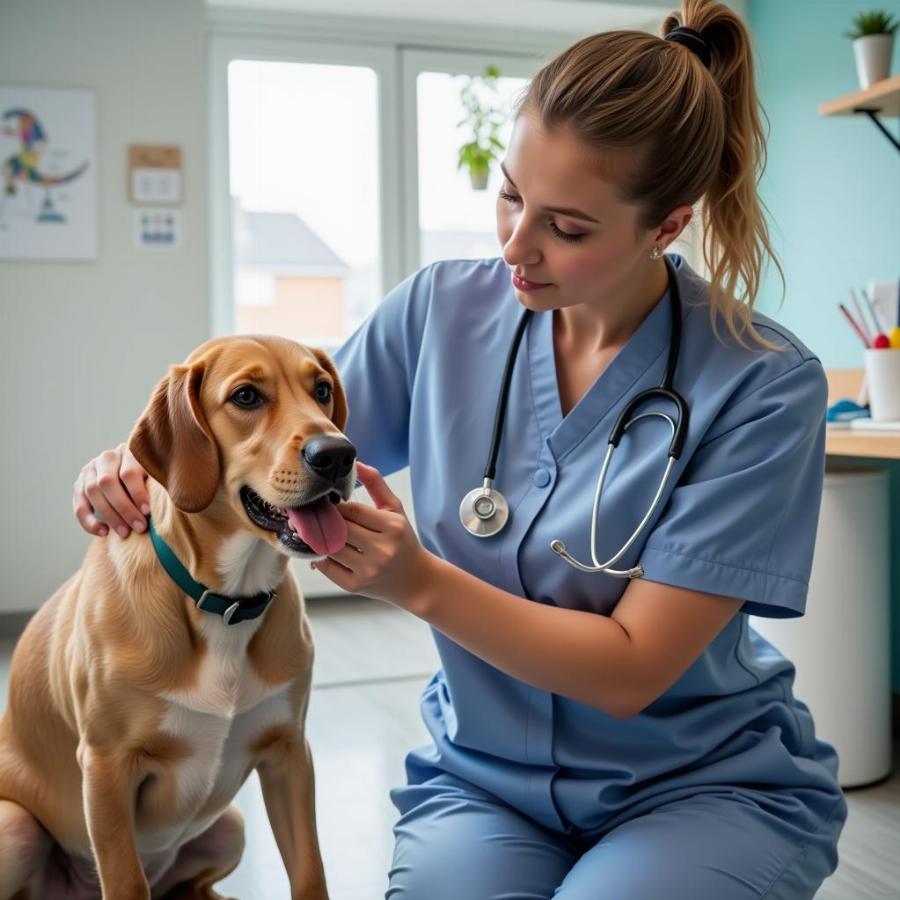When your once reliably house-trained senior dog starts having accidents indoors, it can be frustrating and concerning. Old dog pooping in house isn’t just a behavioral issue; it often signals an underlying medical condition or age-related change. Understanding why your older dog is pooping inside is the first step to resolving the problem and ensuring your furry friend’s comfort and well-being. This article will delve into the common causes, solutions, and strategies for managing this challenging situation.
Why is My Senior Dog Suddenly Pooping in the House?
Several factors can contribute to house soiling in older dogs. As dogs age, they can experience changes in their physical and cognitive abilities that make it harder for them to control their bowels. Some of the most common culprits include:
- Cognitive Decline: Conditions like canine cognitive dysfunction (CCD), similar to Alzheimer’s in humans, can affect a dog’s memory, awareness, and learned behaviors, including house training.
- Medical Conditions: Arthritis, diabetes, kidney disease, inflammatory bowel disease, and tumors can all contribute to fecal incontinence or increased urgency to defecate.
- Medication Side Effects: Certain medications can have digestive side effects, leading to loose stools or increased frequency of bowel movements.
- Changes in Diet: Dietary changes, food intolerances, or a sudden switch to a new food can upset a senior dog’s digestive system and lead to accidents.
- Stress and Anxiety: Changes in routine, the introduction of a new pet, or loud noises can cause stress and anxiety, which can manifest as inappropriate elimination.
- Loss of Mobility: Arthritis, hip dysplasia, or other mobility issues can make it difficult for an older dog to get outside in time to relieve themselves.
How Can I Help My Old Dog Stop Pooping in the House?
Addressing this issue requires a multifaceted approach. First and foremost, a visit to the veterinarian is crucial to rule out any underlying medical conditions. Once medical issues are addressed, or ruled out, you can implement strategies to manage the behavior:
- More Frequent Potty Breaks: Take your senior dog outside more frequently, especially first thing in the morning, after meals, and before bedtime. Consistent potty breaks establish a routine and reduce the chances of accidents.
- Easy Access to Elimination Areas: If mobility is a concern, consider using ramps or steps to help your dog access the outdoors easily. For dogs with severe mobility limitations, indoor potty pads can be a helpful solution. If your dog is suddenly pooping in their crate, you may want to look into why they are suddenly dog suddenly pooping in crate at night.
- Dietary Adjustments: Work with your veterinarian to determine if a change in diet, such as a high-fiber or easily digestible food, could improve your dog’s bowel control.
- Medication Management: If medications are contributing to the problem, discuss alternative options with your veterinarian. Never discontinue or adjust medication without consulting a professional.
 Veterinarian Examining a Senior Dog
Veterinarian Examining a Senior Dog
Managing Incontinence in Older Dogs
If your dog’s accidents are due to incontinence, there are steps you can take to manage the situation:
- Belly Bands or Diapers: These can help contain accidents and keep your house clean. Ensure they fit properly and are changed regularly to prevent skin irritation. You can also find information on other reasons why your dog might be pooping inside in this article on dog poop in house.
- Enzyme Cleaners: Use enzyme-based cleaners to thoroughly clean any soiled areas. This eliminates odors that can encourage repeat accidents.
What if My Dog is Vomiting Too?
If your senior dog is also experiencing vomiting, alongside house soiling, this could indicate a more serious underlying condition. It’s crucial to consult with your veterinarian immediately to rule out potential causes such as gastrointestinal issues or blockages. You can find more information on vomiting in our article on dog vomiting undigested food.
FAQ: Common Questions About Old Dogs Pooping in the House
- Is it normal for older dogs to have accidents? While aging can bring some changes in bowel control, frequent accidents aren’t normal and warrant a veterinary check-up.
- Can I retrain my older dog? Yes, but it requires patience and consistency. Positive reinforcement methods are best.
- What should I do if my dog has an accident? Clean the area thoroughly with an enzyme cleaner and avoid scolding your dog, as this can worsen anxiety.
Conclusion
Dealing with an old dog pooping in house can be challenging, but with patience, understanding, and a proactive approach, you can help your senior companion maintain their dignity and comfort. Remember to consult with your veterinarian to address any potential medical issues and implement strategies to manage the behavior effectively.
Additional Questions to Consider
- How can I create a comfortable and accessible potty area for my senior dog?
- What are the signs of canine cognitive dysfunction, and how is it diagnosed?
- Are there any natural remedies that can help with bowel incontinence in dogs?
More Helpful Articles
Beaut Dogs: Your Trusted Source for Senior Dog Care
Beaut Dogs is dedicated to providing valuable resources for senior dog owners. We understand the unique challenges of caring for aging companions and are committed to helping you provide the best possible care for your furry friend. When you need support, please contact Email: [email protected] to receive detailed and accurate answers from Beaut Dogs. We’re here to help you navigate the joys and challenges of senior dog ownership. Visit https://beautdogs.com for more helpful information.